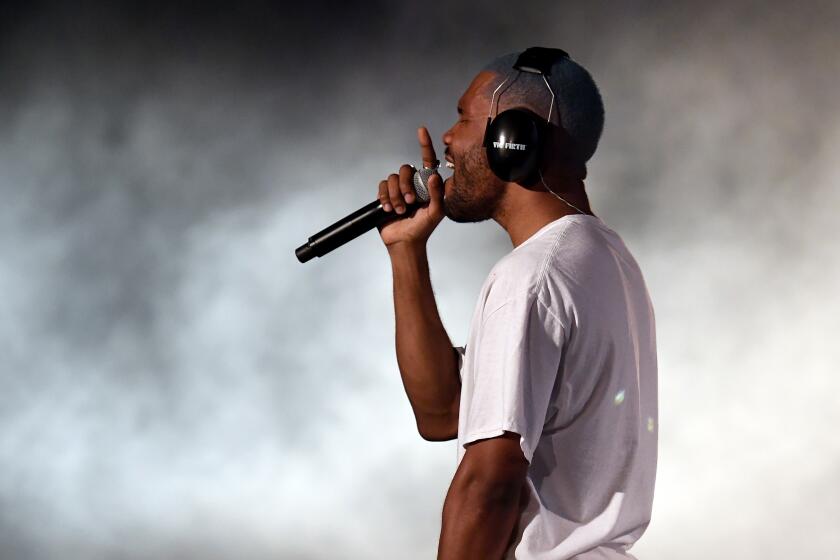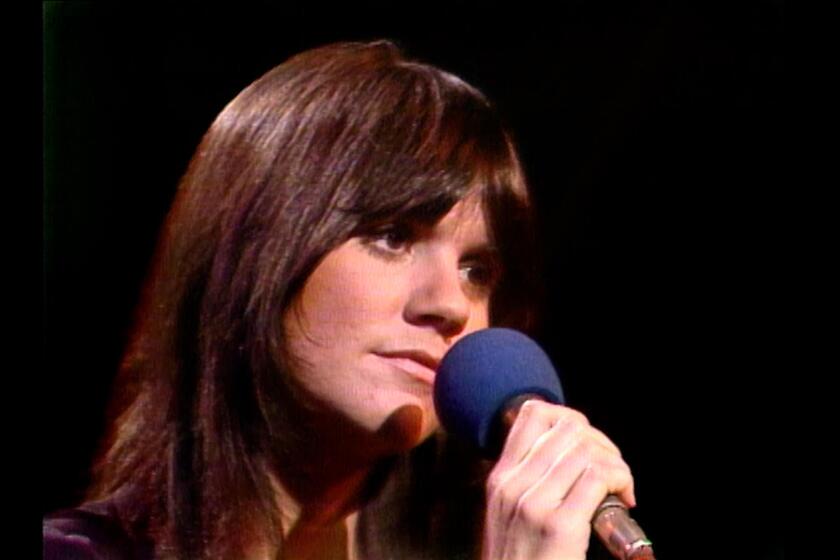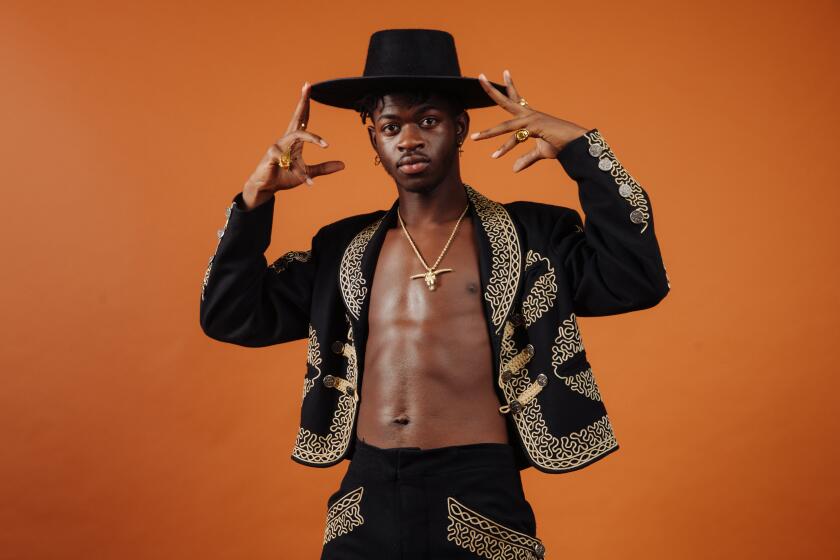- Share via

Last summer, over sushi at Nobu in Malibu, Elliot Grainge convinced the hottest rapper in the world to go into business with him.
Grainge, a 29-year-old Brit whose plummy accent belies the half of his life he’s spent in the U.S., runs 10K Projects, an independent record label he founded fresh out of Northeastern University using a couple hundred grand he’d made flipping an apartment in Boston.
The rapper was Ice Spice.
“We spoke to her very honestly and said, ‘Listen, we see what you’re doing here, and we would like to pour gas on this flame,’” Grainge says now of the dinner with Ice Spice, whose song “Munch (Feelin’ U)” — a deadpan kiss-off set to a minimal Bronx drill beat — had just exploded on TikTok. The song’s viral success had drawn interest from bigger, more established record companies, according to Grainge, including Interscope, Columbia and Republic, as well as Drake’s OVO Sound. “But I felt as though it wouldn’t have been as cool for her at the time to sign to a huge major label,” Grainge says.
His pro-indie spiel is a familiar one. In Grainge’s view, a major is “a conveyor belt with 100 other priorities” at any given moment; it’s slow to react and saddled with “mediocre-at-best product-management departments,” as he puts it. An indie, on the other hand, moves nimbly and with utmost respect for an artist’s vision. His pitch to Ice Spice, similar to ones made by countless earlier indie labels to countless earlier next-big-things: “You’re the boss.”
What distinguishes Grainge’s critique of the major-label system is that it’s coming from inside the house: Grainge’s father is Universal Music Group Chairman and Chief Executive Lucian Grainge, whose role leading the world’s largest record company has put him atop Billboard’s annual Power 100 list a record seven times.
In 2021, Lucian Grainge steered UMG — whose slate of talent includes Taylor Swift, the Weeknd, Billie Eilish, Rihanna, Morgan Wallen, Lady Gaga, Blackpink and the Beatles — toward becoming a publicly traded company; last month, after reporting 2022 revenues of more than $10 billion, the firm announced that it had extended the 63-year-old CEO’s contract to 2028 with a one-time “transition equity award” of $100 million.
Yet the way Elliot Grainge sees it, “In the last few years, the power of the major label has been completely decimated.”
Our critic agrees that Ocean’s much-reviled Coachella performance was a confused and confusing piece of art. But, he argues, that’s a good thing.
Grainge acknowledges that the majors — UMG, Sony Music Entertainment and Warner Music Group, each with a variety of subsidiaries — have enviably deep pockets to fund their acts’ endeavors. “So essentially they’re a bank,” he says on a recent afternoon at the sleek Beverly Grove home of Zach Friedman, 10K’s co-president along with Tony Talamo. “But other than an upfront check and costs covered, I don’t think an artist wants to sign to a major anymore, unless they want to be on the same roster as their icons, which is still a huge pull.”
Discounting acts with what he calls “built-in audience” — the Disney Channel veteran Olivia Rodrigo, for instance, or Harry Styles, who found fame as a member of the boy band One Direction — Grainge says he struggles to think of a single new artist “signed, developed and marketed from scratch to huge fanfare by a major label in the last three years.”
He sits for a moment, his eyes staring out from behind his stylish designer glasses. “Not one example,” he says.
One dinner guest Grainge doesn’t mention in recounting the evening at Nobu is Michelle Jubelirer, chair and CEO of UMG’s Capitol Music Group, which provides distribution services to Grainge’s label and teamed directly with 10K to sign Ice Spice.
“He didn’t say that Capitol was at the dinner?!” Jubelirer asks with a laugh when told this. “That is f—ing amazing.”
Like a real-life version of Kendall Roy on HBO’s “Succession,” Grainge knows that his perception as a nepo baby — to use the term popularized last year in a widely shared New York magazine feature about the children of celebrities who trade on their parents’ connections and fame to pursue similar careers — obliges him to some extent to trash his father’s business. (In 2016, Lucian Grainge was knighted by Prince William, which means technically he’s Sir Lucian.) How else to make a name for himself as something more than a rich kid engaged to be married to another rich kid in 24-year-old Sofia Richie, the model and influencer who’s the youngest of Lionel Richie’s three children?
Even his dad gets it.
“It’s a very Elliot thing to say,” Lucian Grainge writes in an email, responding to his son’s take on the supposed decline of the major label. “In fact, it sounds like something I would have said when I was his age. I guess according to [Elliot’s] logic, it’s a good thing we’ve got as many icons as we have and consistently attract more.”
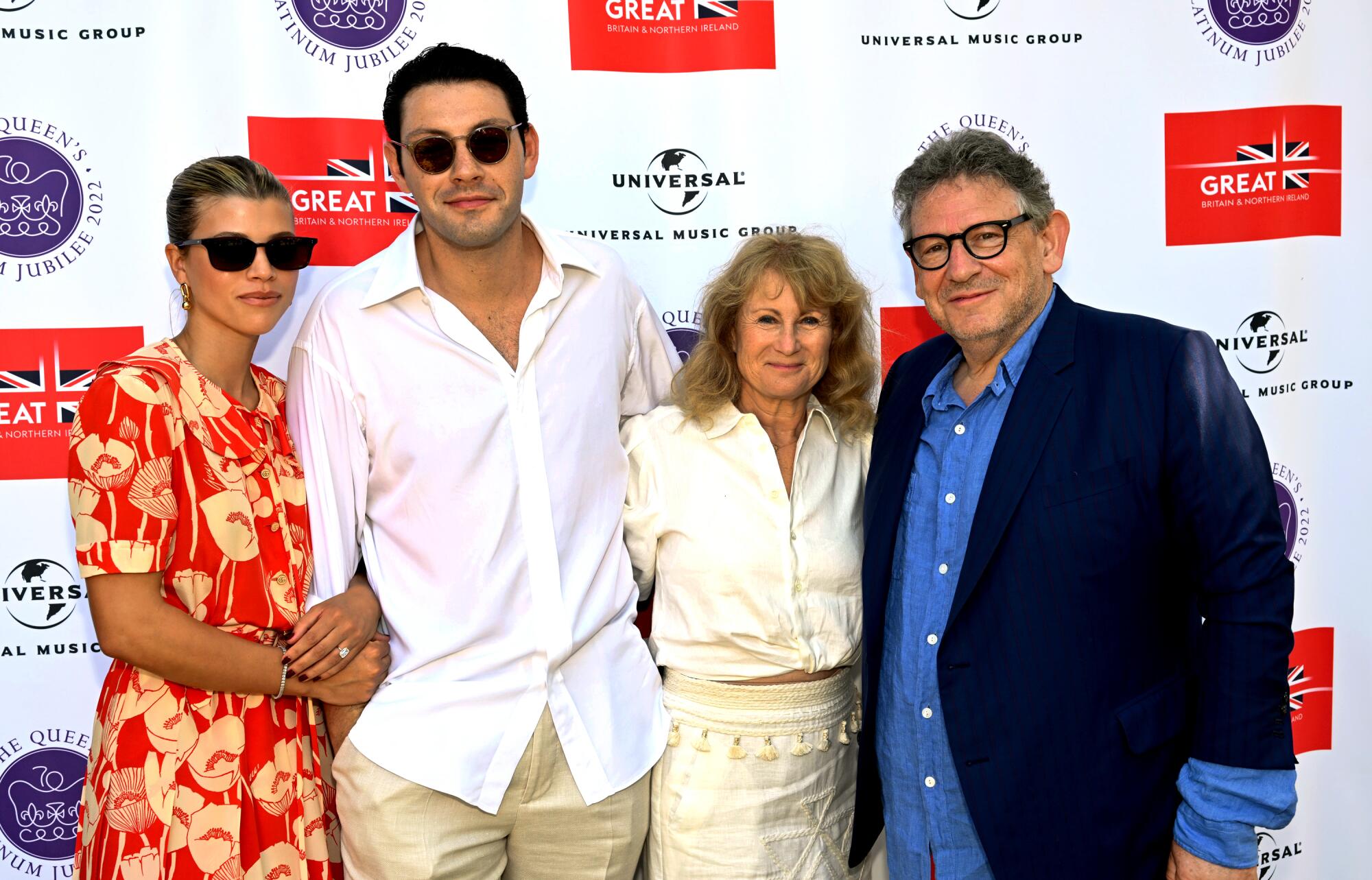
Elliot’s brashness isn’t unfounded. In just seven years, Los Angeles-based 10K has released more than 30 singles that have been certified platinum, including Internet Money’s sing-songy trap hit “Lemonade,” which has more than a billion plays on Spotify, and “Sunday Best” by the breezy pop duo Surfaces, who count Elton John as a fan. Rapper Trippie Redd, one of the label’s first signings, has scored seven Top 5 LPs and mixtapes. And not long after “Munch” took off, 23-year-old Ice Spice outdid that song with her appearance on “Boy’s a Liar Pt. 2,” a sprightly electro-pop tune by the British singer and producer PinkPantheress that’s been hovering around the upper reaches of the Hot 100 for months. Last week, Ice Spice dropped a remix of her song “Princess Diana” featuring Nicki Minaj; the music video already has 15 million views on YouTube.
Those around Grainge say that 10K’s success is a testament to his shrewd use of data, his belief in the potency of social-media influencers and an old-fashioned ability to detect a hit before anyone else. “He’s very smart, and he has great ears,” says Jubelirer. Grainge himself would add that the wisest thing a record executive can do — provided he’s signed the right artist — is to give the artist complete creative control.
“I don’t think there’s ever gonna be a label exec or an A&R guy or a marketing guy who says, ‘Go and sing this different,’ and pushes music forward,” says Grainge, who rarely sits for interviews but spoke with The Times on several occasions over more than a year. “No one was telling Picasso to paint the ear on the left-hand side.”
With a top five album and a prime spot at March’s Rolling Loud festival in Inglewood, the 23-year-old rapper has outlasted many of his peers.
That hands-off attitude — along with what she said in her song “Bikini Bottom” was a $2-million check — is part of what enticed Ice Spice to sign with 10K. (Both Grainge and Jubelirer decline to confirm what they paid the rapper.) “I’ve been pretty much doing whatever I want to do,” Ice Spice says of her time so far on the label. “I love that for me — and for them too, because it’s been working.”
Of course, the enormous commercial might of Wallen’s “One Thing at a Time” and SZA’s “SOS,” to name the two biggest LPs of the year so far, suggests there’s plenty of life left in the major-label approach. Ice Spice’s deal with 10K and Capitol gives the rapper access to the latter’s proven promotional expertise at Top 40 radio — still a crucial engine, despite Grainge’s digital-first evangelizing, for the type of mainstream pop stardom no other 10K artist has achieved.
“As much as I respect Elliot’s stance on the role of major labels, it’s not lost on me that we’ve recently begun a new era in the 10K and Capitol Music Group partnership,” says Jubelirer. “Ultimately, I think his criticisms of major labels are kind of a trope that every indie label has as part of their talking points — and that they need to have as part of their talking points. I would too if I were running an indie.
“It’s theater,” she adds of Grainge’s rhetoric. “But clearly he knows the importance of a major label.”

The last few years have seen something of a feeding frenzy among large music companies eager to snatch up buzzy indies known for creating viral hits. In February, the Atlanta rap label Quality Control, which launched the careers of Migos and Lil Baby, was acquired by Scooter Braun’s Hybe America for an estimated $300 million; before that, Warner reportedly paid $400 million for 300 Entertainment, with a roster that includes Young Thug and Megan Thee Stallion, while Sony took a majority stake in Alamo Records, home to Lil Durk and Rod Wave, for an estimated $200 million.
Fred Davis, a partner at the financial advisory Raine Group who focuses on digital media and was involved in the sale of Quality Control, says “there’s no question” that these kinds of deals will continue in the next five to 10 years thanks to the overall growth of the record business brought on by streaming. It’s not hard to imagine that Grainge is trying to show potential buyers that, for all his tough talk, he’s capable of operating within the major-label model he’s been observing up close since he was young.
“If I’m playing devil’s advocate, I think there are a lot of positive things that the majors can do on an international basis in terms of plugging in their overseas infrastructure to help activate audiences for songs and for artists,” Grainge says in a later interview, softening his initial chest-beating about indies versus majors. He adds that he’s watched Warner Music with interest lately as the company has invested in so-called Web3 and other tech companies and “allowed 300 to operate with the same fierce autonomy as they had before.”
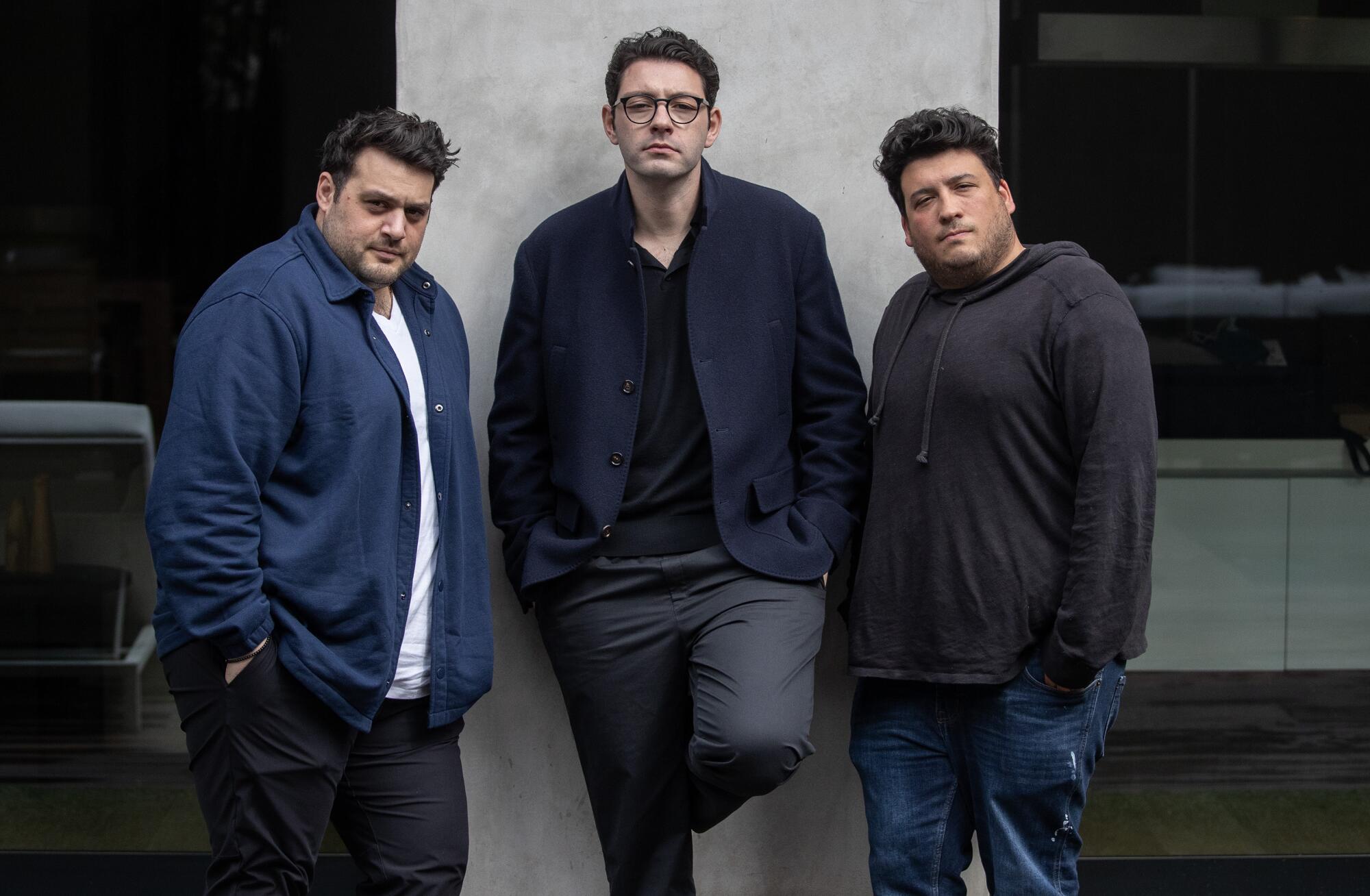
Grainge grew up in the U.K. in comfortable but trying circumstances: As his mother, Samantha Berg, was giving birth to him, she entered a coma as a result of an embolism and never recovered. (Berg died in 2007.) He points to two maternal figures in his life — his aunt Stephanie and his father’s second wife, Caroline, whom Lucian Grainge married when Elliot was 8 — but says his bond with his dad was indelibly shaped by their shared pain.
“I’ve yet to meet someone in my life who’s had a similar experience with their childhood, so it’s difficult to self-analyze,” he says. “But I can tell you that we have a very unique relationship.”
Says Lucian Grainge: “Considering what we’ve been through together personally, in some ways he’s like the twin brother I never had.”
Nearly 50 years after the death of its leader, Father Yod, the Source Family continues to fascinate seekers. Now, Hollywood and content creators want in too.
An “awkward-looking British kid,” per his own description, Elliot fell in love with Eminem at around age 10 (though the U.K. boy band Take That performed at his bar mitzvah); his fascination with American hip-hop — an obsession he says he shares with “every single English-speaking person who grew up in the ’90s and 2000s” — made it easier to get on board when Lucian, soon to be appointed to the top spot at UMG, moved the family, including Elliot’s two half-sisters, to the U.S. in 2009.
Then again, “I didn’t drive at first, which was tough in Los Angeles pre-Uber if you wanted any form of social life outside of class,” he says with a laugh. Yet not long after Grainge got to Northeastern, where he studied sociology and economics, he was wheeling and dealing on Boston’s music scene, promoting shows by Berklee College of Music students at clubs around town under the name Strainge Sessions.
Eventually that became a label he called Strainge Entertainment until he was sued by the veteran rap artist Tech N9ne, who claimed Grainge was infringing on the trademark of his label, Strange Music. Unable to afford a legal fight, he says, Grainge settled with Tech N9ne and renamed his business 10K — a nod to Malcolm Gladwell’s endlessly quoted adage about the number of hours required to achieve expertise in a given field.
“We also worked out that 10,000 degrees is the maximum temperature that you can measure being as close to the sun as possible,” Grainge says.
Back in L.A. after graduating, Grainge found early traction with songs by Iann Dior, who later hit No. 1 with his and 24kGoldn’s emo-rap “Mood,” and Tekashi 6ix9ine, the rapper and social-media fire-starter who in 2018 was sentenced to two years in prison after cooperating with federal prosecutors in a case involving his association with a violent street gang. (Grainge declines to say whether he’s currently in business with 6ix9ine, who crashed back into headlines last month when he was attacked by several people in a South Florida gym.)
From the get-go, Grainge says, the idea for 10K was to use fine-grain data collected online to identify new artists with small but fervent audiences that could be quickly scaled up.
“We could tell you about our research department, but then we’d have to kill you,” he says.
The explosion of TikTok at the beginning of the pandemic confirmed what Grainge and his co-presidents, Friedman and Talamo — whose influencer-management company, Homemade Projects, became a part of 10K last year — say they already knew by then: that the most efficient way to reach coveted Gen Z consumers was through influencers promoting songs in short-form videos.
“We were doing this before anyone else,” says Friedman, recalling their client Jacob Sartorius’ role in breaking DRAM’s 2016 hip-hop hit “Broccoli” on the lip-sync app Musical.ly, which its owner, ByteDance, later rebranded as TikTok. “Back then the major labels all thought it was stupid.”
“Fast forward a few years,” Talamo adds, “and it’s the only thing people spend money on.”
Friedman, who calls 10K “a digital marketing company inside a record label,” echoes Grainge’s line about staying out of artists’ way: “None of us play instruments. None of us produce. What we do is give artists the tools to take their platform and put it on steroids.
“We’re the best marketers in music,” he adds matter-of-factly.
Yet the company also relies on a certain gut instinct for what songs will connect with millions of listeners. Taz Taylor of Internet Money says Grainge had to convince him that “Lemonade” would be a hit. And though Grainge immediately loved Arizona Zervas’ “Roxanne” — the 2019 pop-rap smash he says Zervas played him in a meeting with 10K prior to Zervas’ signing with Sony’s Columbia Records for a reported $10 million — he decided to pass on the rapper after hearing more of his material, none of which has made a commercial dent.
“That was the wrong deal for us,” Grainge says. “Writing a check to buy market share is not what we do. But it made 100% sense for them to do it.”
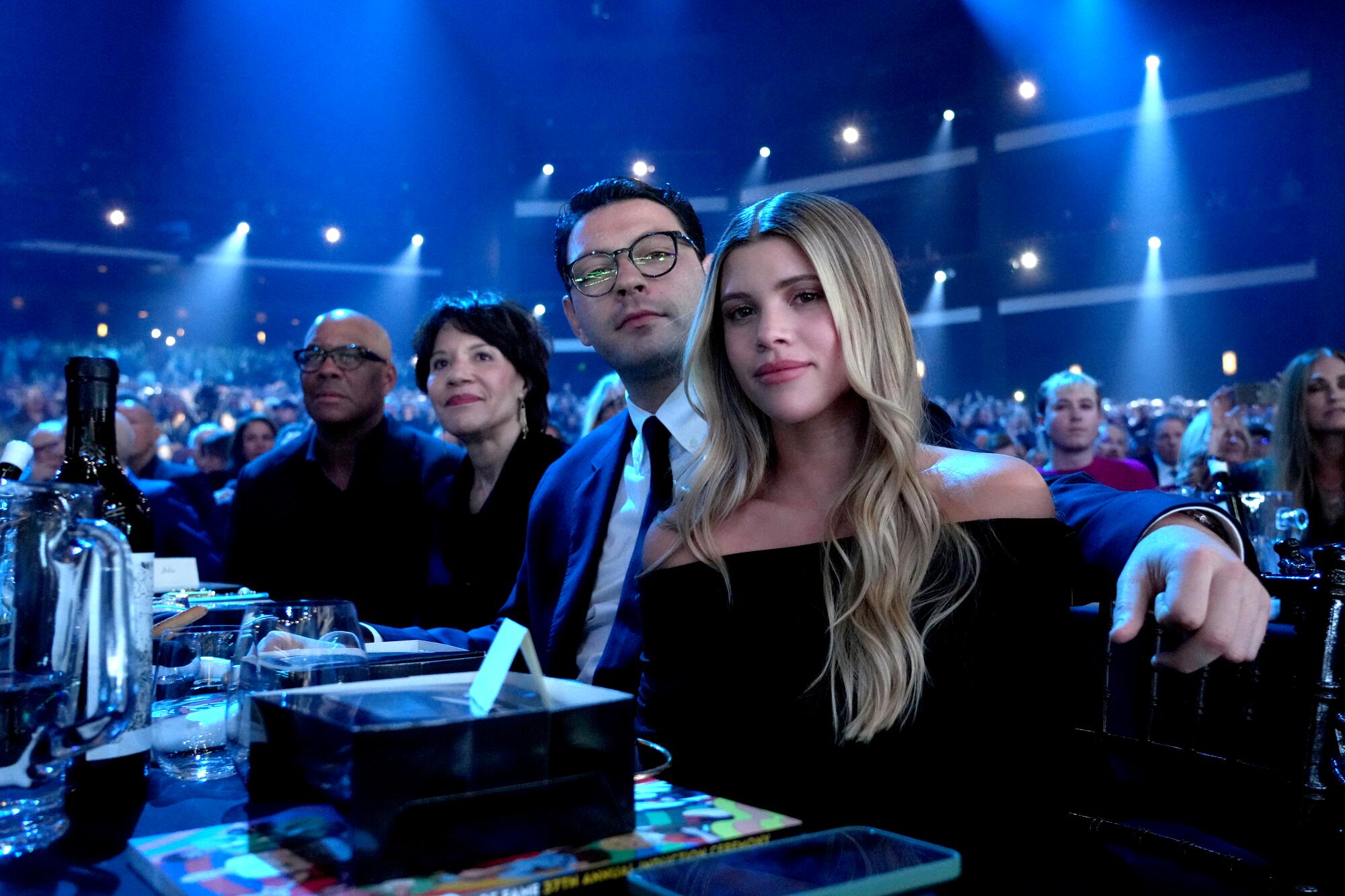
10K has about 30 employees headquartered in Brentwood — and no outside investors, according to Grainge. Remembering her first sit-down with the founder last year at Nobu, Ice Spice says she was impressed by the lack of red tape in Grainge’s decision-making, though Jubelirer’s presence at the dinner was also key. “I love that Michelle is a woman, and a very powerful woman at that,” she says. “That attracted me because I never usually see women in her position.”
Asked whether it’s reasonable to be amused by the ways in which he’s tried to distinguish 10K from the sprawling worldwide company his father runs, Grainge says you have to consider the full picture of his family’s history in music. His grandfather owned a record store; his uncle, Nigel Grainge, founded the indie label Ensign and discovered Sinead O’Connor; his cousin, Nick Shymansky, managed Amy Winehouse early in her career. Before he took over at UMG, Lucian Grainge worked in A&R and music publishing.
“So there’s a true map of all the different sectors of the industry,” he says, “which I’ve been fortunate enough to soak up the history of.”
Grainge is aware that those family ties only deepen his music-biz nepo-baby reputation — the latest in a line of successful second-generation execs that also includes Harry Styles and U2 manager Jeffrey Azoff, whose father Irving helped shepherd the Eagles to fame; Michael Ostin, son of the late Warner Bros. Records honcho Mo Ostin; and the Raine Group’s Davis, whose father is the Arista Records founder Clive Davis.
“I’ve dealt with people in music who come from situations like Elliot’s,” Taz Taylor says, “and to a lot of them, this is just like racquetball on Wednesday.”
Does the nepo-baby discourse get Grainge down?
“Does the nepo-baby discourse get me down?” he repeats slowly, then pauses. “I try not to think about it, to be honest with you. But I’ll take the bait: I understand that because of my name there’s a target on my back. If we do well, it’s because of the connections. And if we don’t do well — if we fail — then you could go, ‘Well, they’re not as good as so-and-so.’
“But we’ve not done this once or twice as a company,” he says, meaning make a hit record or get an artist’s career off the ground. “We’ve done it a dozen-plus times. Our hit rate is really good, and you can’t fake that in business. The repeated success should dispel any notion that we’ve only been successful because of this reason.”
Where to see classic performances from David Bowie, Linda Ronstadt and Tina Turner? YouTube is now home to clips from Burt Sugarman’s late-night show.
It’s an uncharacteristic moment of bravado for Grainge, who will happily dish about others but is more reserved when discussing himself; indeed, his general aversion to the oversharing endemic to social media — Grainge’s verified Twitter account boasts exactly one tweet — is a funny trait for someone preparing to marry a woman whose job is to narrativize her life.
“You can’t help who you fall in love with,” he says with a shrug of Richie, whom he’s known since he was young. (Count Lionel Richie as a proud member of the UMG family.) This month Sofia told her 8 million Instagram followers that she’d converted to Judaism ahead of her and Grainge’s wedding, which to judge by photos she’s posted appears set for this weekend in Europe. “I really try and keep the profile as low as possible,” Grainge says.
“My happy place is with my girl on the couch binging a TV series where we argue about which episode we’re on,” he says of nights at home with Richie, with whom he was reported last year to have spent $27 million on an estate in Brentwood. Grainge tallies “a very limited number of very close friends,” as he puts it, though his dad’s pal Allen Grubman, the powerful entertainment lawyer, says Elliot’s “emotional intelligence was off the charts” even as a kid.
And what of his long-term plans as an executive? Fred Davis says that, given “the consistency of A&R success,” Grainge “could expect healthy bidding from all the major labels” if he were to sell all or part of 10K.
Grainge says he’s keeping his options open, “whether we stay on and grow the label and keep it for decades or whether a partner comes in and helps us take it to the next level.”
One person he won’t be seeking advice from is his father, with whom he talks about everything — England’s Arsenal soccer team, their favorite old records — except the specifics of each of their two companies.
“We separate it like church and state,” Grainge says. “Otherwise we’d be agreeing or disagreeing on too much. We’ll talk about where the market is but never anything in detail of his business or my business. We’ve never crossed that line.”
More to Read
The biggest entertainment stories
Get our big stories about Hollywood, film, television, music, arts, culture and more right in your inbox as soon as they publish.
You may occasionally receive promotional content from the Los Angeles Times.
